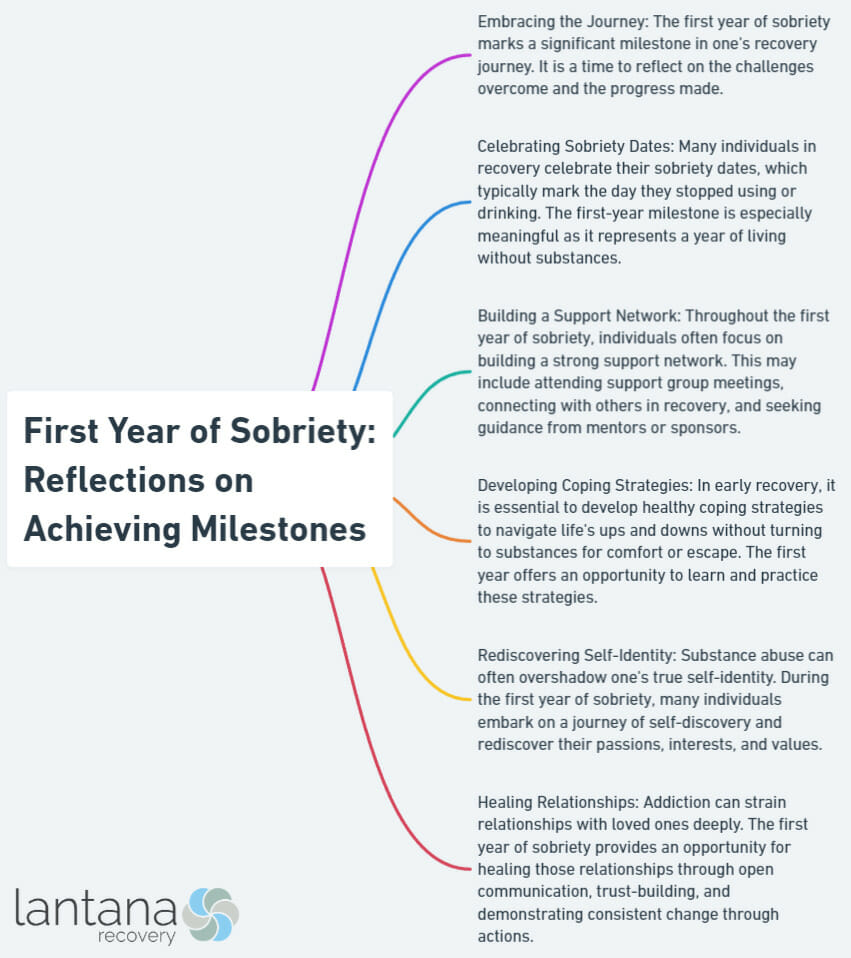The first year of sobriety is a significant milestone in the journey towards recovery from addiction. It marks a period of transformation, growth, and self-discovery. This article aims to explore the various aspects of the first year of sobriety and reflect on achieving important milestones during this time.
The first year of sobriety holds great significance because it is a time of adjustment and adaptation to a new way of living. It is a period of learning to navigate life without the crutch of substances and developing healthy coping mechanisms. The first year is a foundation for long-term sobriety and sets the tone for future success in recovery.
However, the first year of sobriety is not without its challenges. Individuals may face various obstacles such as craving substances, dealing with withdrawal symptoms, navigating triggers and temptations, managing emotions, rebuilding relationships, and creating a new support network. It requires resilience, determination, and commitment to overcome these challenges and maintain sobriety.
Throughout the first year of sobriety, there are several milestones that are worth celebrating as they symbolize progress and achievement. These milestones include reaching 30 days sober, building momentum at 90 days sober, reaching the halfway mark at 6 months sober, and the major milestone of celebrating one year of sobriety. Each milestone represents a victory on the path to recovery and serves as a reminder of the progress made.
Reflecting on the achievements and milestones during the first year of sobriety allows individuals to gain insight into their journey. It provides an opportunity to acknowledge personal growth, assess the challenges overcome, and identify the key learnings along the way. Reflection fosters self-awareness, gratitude, and a deeper understanding of oneself and the recovery process.
For those embarking on their first year of sobriety, it is helpful to receive advice and guidance from those who have navigated this journey before. Words of wisdom, coping strategies, and practical tips can provide valuable support and encouragement during this transformative time. Hearing advice from individuals who have successfully completed their first year of sobriety can inspire and motivate others to persevere and embrace the possibilities of a sober life.

Why is the First Year of Sobriety Significant?
The first year of sobriety is significant for several reasons. There are a few key reasons why the first year is important. Firstly, individuals go through significant physical and mental changes as their bodies heal from substance abuse. This recovery process is crucial for improving their well-being and cultivating a healthier lifestyle.
Secondly, the first year of sobriety provides an opportunity for self-discovery and personal growth. By refraining from drugs or alcohol, individuals can reflect on their past behaviors and make positive changes to enhance their lives.
Moreover, the first year serves as a milestone and a foundation for long-term recovery. Statistics indicate that the risk of relapse is highest during this initial year. Therefore, successfully completing this period significantly increases the chances of maintaining abstinence.
Additionally, achieving the first year of sobriety is often celebrated as a great accomplishment within the recovery community. It represents a commitment to change, resilience, and the ability to overcome challenges.
Lastly, during this critical phase, individuals can establish a support network, seek therapy, and learn coping mechanisms to navigate future challenges. Building a strong foundation for recovery in the first year is crucial for ongoing success in sobriety. The first year of sobriety is significant for several reasons.

What are the Challenges Faced in the First Year?
The first year of sobriety can be challenging. Individuals face obstacles that test their commitment to a sober lifestyle. Here are the challenges faced in the first year:
1. Withdrawal symptoms: In the journey to sobriety, individuals undergo detoxification, which can lead to experiencing withdrawal symptoms. These symptoms can vary from discomfort to intense cravings, difficulties with sleep, feelings of anxiety, and even depression.
2. Temptations and triggers: Being in environments or around people who use substances can act as triggers for cravings. It is crucial to avoid such situations and instead find healthy coping mechanisms to navigate through these temptations.
3. Emotional instability: Many individuals go through intense emotions without relying on substances. They often struggle with managing stress, anxiety, and depression.
4. Rebuilding relationships: Substance abuse can strain relationships, causing damage and a loss of trust. Rebuilding and repairing these relationships require patience, understanding, and forgiveness.
5. Loneliness and isolation: Letting go of old social circles that revolve around substance use can leave individuals feeling lonely and isolated. It is important to find support and participate in sober activities to combat these feelings.
6. Developing coping mechanisms: Taking the time to learn healthy ways to manage stress and handle triggers involves engaging in therapy, exercise, hobbies, or mindfulness practices.
7. Fear of relapse: There is a constant concern about slipping back into old habits. Staying accountable, attending support groups, and having a strong support system can help address and alleviate this fear.
True story:
A close friend recently completed their first year of sobriety. Dealing with temptations and triggers proved to be their most challenging obstacle. They had to distance themselves from friends who continued to abuse substances and actively sought out new social environments that did not involve alcohol or drugs. Although it was occasionally a lonely experience, joining a sober support group provided much-needed companionship. By developing new coping mechanisms and finding healthier ways to handle stress, they successfully overcame their cravings. Reflecting on their journey, they emphasize the importance of focusing on the positive aspects of sobriety and finding joy in small victories.

Celebrating Milestones in the First Year of Sobriety
Achieving milestones in the first year of sobriety is a cause for celebration. From the initial accomplishment of 30 days sober to the momentous one-year mark, each milestone represents a significant step on the journey of reclaiming one’s life. In this section, we’ll explore the different milestones along the way, highlighting the importance of each and the progress they signify. So, let’s raise a glass (of sparkling water) and commemorate these incredible achievements in the first year of sobriety!
1. 30 Days Sober: The First Milestone
30 Days Sober: The First Milestone signifies an important achievement in the journey of sobriety. It is a time to celebrate and reflect on the progress made in the initial month of becoming sober. During this significant milestone, individuals experience many positive changes as they strive to break free from addiction.
One crucial lesson during the first month of sobriety is realizing that living without relying on substances is possible. This newfound freedom and control over one’s actions empower and boost self-confidence. Additionally, individuals may notice improvements in physical and mental well-being, such as clearer thinking, increased energy levels, and improved sleep patterns.
It is important to recognize that the first month of sobriety can present challenges. Withdrawal symptoms, cravings, and the temptation to relapse are common hurdles faced during this time. However, by staying committed and seeking support from friends, family, or support groups, individuals can overcome these challenges and continue on the path to sobriety.
As advice for those starting their first month of sobriety, it is crucial to celebrate this milestone and acknowledge the progress made. Reflecting on the positive changes experienced in a short time can serve as motivation to keep going. Remembering that each day brings them closer to a healthier and addiction-free life can help individuals stay determined and focused.
2. 90 Days Sober: Building Momentum
Reaching the milestone of being 90 days sober is a significant achievement that helps in building momentum towards long-term recovery. Let’s consider the following steps to strengthen this momentum:
1. Make a firm commitment to sobriety and embrace positive changes. This commitment will serve as a strong foundation for your recovery journey.
2. Surround yourself with a strong support system of family, friends, and support groups. Having a network of people who understand and encourage your sobriety will provide invaluable assistance along the way.
3. Engage in therapy or counseling to address underlying issues and learn healthy coping mechanisms. This professional guidance will enable you to delve into the root causes of your addiction and develop effective strategies for overcoming them.
4. Adopt a healthy lifestyle with regular exercise, balanced nutrition, and sufficient sleep. Taking care of your physical well-being will improve your overall quality of life and contribute to your sobriety.
5. Identify triggers and avoid situations or people that may tempt a relapse. Building resilience and developing effective strategies to overcome challenges will empower you to steer clear of potential obstacles.
6. Explore new hobbies and interests that bring joy and fulfillment. By diverting your attention away from cravings, you can discover new passions that enhance your sobriety journey.
7. Set realistic short-term and long-term goals. Celebrate smaller milestones, such as reaching 90 days sober, as they provide motivation and reinforcement for your progress.
8. Prioritize your emotional well-being through self-care, stress management, and seeking professional help if needed. Taking care of your mental health is crucial for maintaining sobriety.
9. Give back to others through support groups, volunteering, or mentoring individuals on the path to recovery. Sharing your experience and offering support can be incredibly rewarding for both you and those you help.
By following these steps and staying focused on your sobriety, the 90-day mark can serve as a turning point in building the momentum for a healthier and happier life.
3. 6 Months Sober: Halfway There
Halfway through the first year of sobriety, after being six months sober, significant progress has been made. At this point, individuals may face emotions and challenges that test their commitment to sobriety. Let’s consider some key points during this halfway mark of sobriety:
1. Progress: At this stage, individuals have abstained from substances for six months, which is a commendable accomplishment. Reflect on the positive changes that have occurred since becoming sober.
2. Resilience: The first six months of sobriety can be challenging. Dealing with cravings, triggers, and establishing new coping mechanisms requires resilience and determination. Recognize the strength cultivated throughout this journey.
3. Support Network: By this point, individuals should have built a support network consisting of friends, family, and possibly attendance at support group meetings or therapy sessions. Utilize this network for continued encouragement and guidance throughout the first year.
4. Continued Growth: Reaching the halfway mark is significant, but the journey to sustained sobriety is ongoing. Maintain focus and continue working towards personal growth, addressing underlying issues.
5. Future Goals: Use this milestone as an opportunity to set goals for the remaining six months and beyond. Consider aspirations for personal and professional development, relationships, and overall well-being.
Progress at the six-month mark shows one’s commitment to sobriety. By persevering through challenges and maintaining focus, individuals can continue to build a fulfilling and substance-free life.
4. 1 Year Sober: Celebrating One Year of Sobriety
Reaching the monumental achievement of 1 Year Sober is a momentous occasion that symbolizes dedication, perseverance, and strength. When commemorating this milestone, it is important to consider the following key elements:
1. Reflect on your progress: Take a moment to acknowledge the incredible progress you have made on your journey to sobriety. Reflect upon the positive transformations such as improved relationships, enhanced physical and mental well-being, and heightened self-esteem.
2. Celebrate with loved ones: Share your momentous accomplishment with the people who have stood by you throughout this challenging journey. Surround yourself with those who have offered unwavering support and genuine understanding.
3. Set new goals: Utilize this significant milestone as an opportunity to establish new objectives for your ongoing sobriety. Engage in hobbies, acquire new skills, and emphasize personal growth to cultivate a sense of purpose and motivation.
4. Practice self-care: Celebrating 1 Year Sober truly exemplifies your exceptional strength and resilience. Prioritize self-care by engaging in activities such as exercise, meditation, and spending time in nature. This is crucial in maintaining a positive mindset and guarding against the possibility of relapse.
True story: Emily, after enduring years of adversity due to her alcohol addiction, achieved the remarkable feat of reaching 1 Year Sober. To celebrate this significant milestone, she hosted an intimate gathering with her closest friends and family. Emily conveyed profound gratitude for the unwavering support she received and established new aspirations, such as pursuing her passion for art by returning to school. With a renewed sense of determination, she continued to prioritize her well-being and accomplished even greater milestones on her arduous journey of sobriety.

Reflections on Achieving Sobriety Milestones
Achieving sobriety milestones is a significant accomplishment that deserves reflection and celebration. Here are some reflections on achieving sobriety milestones:
1. Personal growth: Achieving sobriety milestones signifies personal growth and a commitment to a healthier lifestyle. It shows strength and resilience in overcoming challenges.
2. Improved relationships: Sobriety milestones often lead to improved relationships with family, friends, and loved ones. By abstaining from alcohol or drugs, individuals can rebuild trust and create healthier connections.
3. Enhanced well-being: Sobriety milestones bring improvements in physical and mental well-being. Staying sober boosts overall health, including better sleep patterns, increased energy levels, and improved mental clarity.
4. Greater self-awareness: Achieving sobriety milestones allows individuals to gain a deeper understanding of themselves. They can reflect on past behaviors, identify triggers, and cultivate healthier coping mechanisms.
5. Financial stability: Sobriety milestones can contribute to financial stability. Abstaining from substance abuse allows individuals to save money previously spent on alcohol or drugs, leading to more financial security.
6. Increased productivity: Sobriety milestones often lead to increased productivity in various aspects of life. Without the distractions and negative impacts of substance abuse, individuals can focus more on their goals and aspirations.
Reflecting on these milestones serves as a reminder of the progress made and the challenges overcome in the journey towards sobriety. It highlights personal growth, improved relationships, enhanced well-being, greater self-awareness, financial stability, and increased productivity.
John, a recovering alcoholic, has been celebrating sobriety milestones for the past year. He reflects on achieving these milestones with pride and gratitude. Through his journey, he has experienced personal growth and a renewed sense of purpose. John’s relationships with his family and friends have significantly improved, as they have seen his commitment to sobriety. He appreciates the positive impact it has had on his overall well-being, from better sleep to improved mental clarity. John has also gained a deeper understanding of himself, reflecting on past behaviors and triggers while cultivating healthier coping mechanisms. Achieving sobriety milestones has not only brought emotional and physical benefits but also financial stability as he redirected the money previously spent on alcohol towards savings. With newfound clarity and focus, John has become more productive in his professional and personal life. Reflecting on these milestones reminds John of how far he has come and motivates him to continue his journey of sobriety.
What Have Been the Key Learnings during the First Year of Sobriety?
During the first year of sobriety, individuals face challenges and experiences that lead to key learnings. These learnings are crucial for their journey towards lasting recovery.
One of the key learnings during the first year of sobriety is understanding triggers, patterns, and underlying reasons for addiction. This self-discovery is important in developing healthier coping mechanisms.
Another important learning is the significance of having a strong support system. Individuals realize the importance of surrounding themselves with understanding people who can provide encouragement and guidance.
The first year of sobriety also teaches individuals about resilience and perseverance. They learn how to overcome setbacks and maintain sobriety despite temptations or difficult emotions.
Moreover, individuals learn effective strategies to manage cravings, handle stress, and avoid triggers during their first year of sobriety. These relapse prevention strategies serve as tools for long-term sobriety.
Additionally, the first year of sobriety often involves significant emotional growth. Individuals learn healthy ways to process and express emotions, contributing to overall well-being and enhancing their ability to maintain sobriety.
To maximize the first year of sobriety, it is important to embrace self-discovery and surround oneself with a supportive community. Every setback is an opportunity for growth, and implementing relapse prevention strategies can lead to lasting sobriety.
Advice for Others Starting Their First Year of Sobriety
Starting your first year of sobriety can be challenging but rewarding. Here is some advice for others starting their first year of sobriety:
1. Surround yourself with a strong support system: Building a network of friends, family, or a recovery community can enhance your chances of success.
2. Set realistic goals: It’s important to have clear and achievable goals during your first year of sobriety. This will help you stay focused and motivated.
3. Take it one day at a time: Sobriety is a lifelong commitment, but focus on the present moment. By living in the present, you can avoid feeling overwhelmed and stay dedicated to your recovery.
4. Develop healthy coping mechanisms: During your first year, find healthy ways to cope with stress, triggers, and cravings. This could include mindfulness, exercise, or hobbies that bring joy.
5. Celebrate milestones: Acknowledge and celebrate your accomplishments along the way. Whether it’s a week, month, or year of sobriety, each milestone is a testament to your strength and commitment.
6. Seek professional help if needed: If you struggle or face challenges, reach out for professional support. Therapists, counselors, or support groups can provide valuable guidance.
Remember, everyone’s journey is unique, and what works for one person may not work for another. Trust yourself, stay committed, and never underestimate the power of perseverance.
Frequently Asked Questions
1. What are some milestones to celebrate during the first year of sobriety?
Some milestones to celebrate during the first year of sobriety include 24 hours, one week, 30 days, 90 days, 1 year, and 5+ years. Additionally, breaking the physical dependency, achieving personal goals, experiencing emotions again, and healing relationships are also important milestones to consider.
2. How can keeping a sobriety journal help in the first year of recovery?
A sobriety journal can be a powerful tool in the first year of recovery as it allows you to track your progress, set personal goals, and reflect on your journey. Writing down goals and tracking important days can help you stay motivated and reinforce your commitment to sobriety. It also provides a space to document your ups and downs, allowing you to see your growth and stay strong.
3. What are some common physical and mental changes that may occur in the first 30 days of sobriety?
In the first 30 days of sobriety, it is common to experience physical discomfort such as nausea, headaches, sleep disruptions, night sweats, and loss of appetite. These symptoms may continue for several weeks or months, known as post-acute withdrawal syndrome (PAWS). Mental changes, including anxiety, depression, intense cravings, mood swings, and obsessive thoughts, may also be experienced.
4. How can I celebrate my achievements in sobriety without triggering a relapse?
Celebrating milestones in sobriety is important, but it’s crucial to do so in a safe and non-triggering way. Some ideas for safe celebrations include getting together with loved ones, enjoying the outdoors, traveling, trying new food, or giving back through community service. It’s important to choose activities that do not involve alcohol or environments that may tempt you to relapse.
5. How do the physical and mental benefits of sobriety change over the course of the first year?
Over the course of the first year of sobriety, physical and mental health improve. At the three-month mark, physical and psychological withdrawal symptoms improve, and better sleep, reduced anxiety, and other benefits of sobriety are experienced. By six months, confidence in sobriety increases, and at one year, physical benefits such as improved sleep and reduced risk of alcohol-related conditions are notable. Mental and emotional health also improve, relationships may strengthen, and work life may become more stable.
6. How important is it to celebrate the one-year milestone in sobriety?
Celebrating the one-year milestone in sobriety is crucial. It serves as a reflection of your personal story and the progress you have made in overcoming addiction. It is a sign of growth and shows that you have successfully maintained sobriety for a significant period of time. Celebrating achievements helps reinforce sobriety and provides motivation for the lifelong journey ahead. It can be done through reflection, community service, or special celebrations with loved ones.








